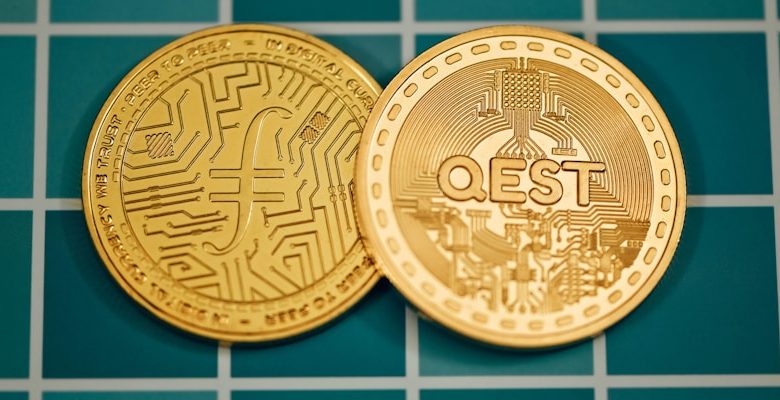The Role of Governance Tokens in Decentralized Ecosystems

- Understanding Governance Tokens and Their Impact on Decentralized Ecosystems
- The Evolution of Governance Tokens and Their Importance in DeFi
- Exploring the Functionality of Governance Tokens in Decentralized Governance
- The Influence of Governance Tokens on Decision-Making in Decentralized Communities
- The Role of Governance Tokens in Promoting Transparency and Accountability
- Challenges and Opportunities in the Governance Token Landscape
Understanding Governance Tokens and Their Impact on Decentralized Ecosystems
Governance tokens play a crucial role in decentralized ecosystems, as they enable token holders to participate in decision-making processes regarding the future development and management of the ecosystem. These tokens provide holders with the right to vote on proposals related to protocol upgrades, funding allocation, and other governance-related matters. Through the use of governance tokens, community members can collectively steer the direction of the ecosystem, ensuring that it aligns with their interests and values.
By holding governance tokens, participants gain a stake in the decentralized ecosystem and are incentivized to actively engage in its governance. This active participation fosters a sense of ownership and responsibility among token holders, leading to a more vibrant and sustainable ecosystem. Additionally, governance tokens can be used to signal support for specific proposals or initiatives, helping to gauge community sentiment and prioritize decision-making processes.
The impact of governance tokens on decentralized ecosystems is profound, as they empower community members to shape the future of the ecosystem in a decentralized and transparent manner. By giving token holders a voice in governance processes, these tokens promote inclusivity and democratic decision-making within the ecosystem. Furthermore, governance tokens can help mitigate conflicts of interest and ensure that decisions are made in the best interest of the community as a whole.
In conclusion, governance tokens are an essential component of decentralized ecosystems, enabling community members to actively participate in governance processes and collectively steer the direction of the ecosystem. By fostering transparency, inclusivity, and accountability, governance tokens play a critical role in ensuring the long-term sustainability and success of decentralized ecosystems.
The Evolution of Governance Tokens and Their Importance in DeFi
Governance tokens have played a crucial role in the evolution of decentralized finance (DeFi) ecosystems. These tokens grant holders the power to participate in decision-making processes regarding the future development and direction of the platform. The importance of governance tokens lies in their ability to democratize the governance of decentralized protocols, giving users a voice in how the system is run.
One of the key features of governance tokens is their role in facilitating decentralized decision-making. Holders of these tokens can propose and vote on changes to the protocol, such as upgrades, new features, or changes to parameters. This ensures that the platform evolves in a way that reflects the desires and needs of its community, rather than being controlled by a central authority.
Furthermore, governance tokens incentivize active participation and engagement within the DeFi ecosystem. By holding tokens, users have a stake in the success of the platform and are more likely to contribute positively to its growth and development. This increased engagement helps to build a strong and vibrant community around the protocol, leading to a more resilient and sustainable ecosystem.
In conclusion, governance tokens have become an essential component of decentralized ecosystems, providing a mechanism for decentralized decision-making and community engagement. By empowering users to have a say in the governance of the platform, these tokens help to create a more inclusive and democratic system that is aligned with the interests of its stakeholders.
Exploring the Functionality of Governance Tokens in Decentralized Governance
Governance tokens play a critical role in decentralized ecosystems by enabling token holders to participate in decision-making processes. These tokens represent voting power that can be used to influence the direction of a project or protocol. By holding governance tokens, users can propose and vote on changes, upgrades, or other decisions that impact the ecosystem as a whole.
One of the key functionalities of governance tokens is their ability to incentivize active participation in the governance process. Token holders are motivated to engage with the ecosystem, as their votes can directly impact the future development of the project. This active participation helps ensure that decisions are made with the best interests of the community in mind.
Furthermore, governance tokens can also be used to delegate voting power to other users or groups within the ecosystem. This delegation mechanism allows token holders to have their voices heard even if they are unable to participate directly in every decision-making process. Delegating voting power can help ensure that decisions are made efficiently and effectively, while still representing the interests of the broader community.
Overall, governance tokens are a powerful tool for decentralized governance, enabling token holders to actively participate in decision-making processes and shape the future of the ecosystem. By incentivizing participation and enabling delegation, governance tokens help create a more democratic and transparent governance model that empowers the community to have a voice in the direction of the project.
The Influence of Governance Tokens on Decision-Making in Decentralized Communities
In decentralized ecosystems, governance tokens play a crucial role in decision-making processes within the community. These tokens grant holders the right to vote on proposals and changes that impact the ecosystem. The influence of governance tokens on decision-making is significant, as they allow for a more democratic and transparent governance structure.
By holding governance tokens, community members can actively participate in shaping the future of the ecosystem. This participation fosters a sense of ownership and belonging among token holders, leading to increased engagement and commitment to the community’s success. Additionally, governance tokens incentivize active involvement in decision-making processes, ensuring that the interests of the community are represented.
Moreover, governance tokens enable token holders to collectively govern the ecosystem without relying on centralized authorities. This decentralized governance model promotes resilience and sustainability by distributing power and decision-making authority among community members. As a result, the ecosystem becomes more adaptable to changes and less susceptible to manipulation or control by a single entity.
Overall, the influence of governance tokens on decision-making in decentralized communities is paramount. These tokens empower community members to actively participate in governance processes, leading to a more inclusive and democratic ecosystem. By leveraging the collective wisdom and expertise of token holders, decentralized ecosystems can make informed decisions that benefit the community as a whole.
The Role of Governance Tokens in Promoting Transparency and Accountability
One key function of governance tokens in decentralized ecosystems is their role in promoting transparency and accountability within the community. By holding governance tokens, token holders have the ability to participate in decision-making processes that affect the ecosystem as a whole. This participation ensures that decisions are made in a transparent manner, with the community’s best interests in mind.
Governance tokens enable token holders to vote on proposals, such as changes to the protocol or the allocation of funds. This voting process helps to ensure that decisions are made collectively and democratically, rather than by a select few individuals. In this way, governance tokens help to distribute power more evenly within the ecosystem, promoting accountability among all participants.
Furthermore, the use of governance tokens can help to prevent centralization of power within decentralized ecosystems. By giving token holders a say in important decisions, governance tokens help to decentralize governance and ensure that no single entity has undue influence over the ecosystem. This decentralization promotes fairness and equality among all participants, fostering a more vibrant and diverse community.
In conclusion, governance tokens play a crucial role in promoting transparency and accountability within decentralized ecosystems. By enabling token holders to participate in decision-making processes, governance tokens help to ensure that decisions are made in a transparent and democratic manner. This transparency and accountability are essential for the long-term success and sustainability of decentralized ecosystems.
Challenges and Opportunities in the Governance Token Landscape
In the governance token landscape, there are numerous challenges and opportunities that can impact the decentralized ecosystems they are a part of. One of the main challenges is ensuring widespread participation and engagement from token holders in the decision-making process. Without active involvement from a diverse range of stakeholders, governance mechanisms may not accurately reflect the desires of the community.
Another challenge is the potential for governance tokens to be concentrated in the hands of a few powerful entities, leading to centralization of control. This can undermine the principles of decentralization and result in decisions that benefit a select few rather than the broader community. Finding ways to distribute governance tokens more equitably can help address this issue.
On the flip side, governance tokens also present exciting opportunities for driving innovation and collaboration within decentralized ecosystems. By giving token holders a say in how the ecosystem is governed, projects can benefit from the collective wisdom and creativity of their community. This can lead to more responsive and adaptive governance structures that better serve the needs of users.
Additionally, governance tokens can be used to incentivize participation and reward contributions to the ecosystem. By offering governance rights as a form of compensation, projects can encourage users to actively engage with the platform and help shape its future direction. This can lead to a more vibrant and dynamic ecosystem that is driven by the collective efforts of its members.
Overall, the governance token landscape is a complex and evolving space that presents both challenges and opportunities for decentralized ecosystems. By addressing issues of participation, distribution, and incentivization, projects can harness the power of governance tokens to create more inclusive and effective governance structures that empower their communities.



